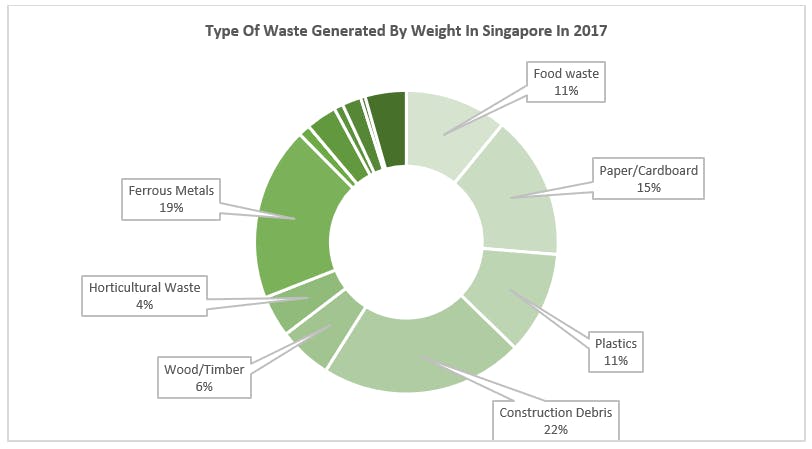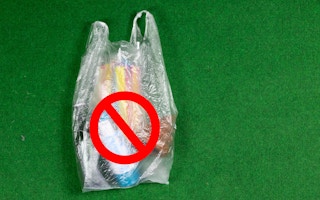Plastic waste pollution is now a widespread problem for our natural environment. Just recently, the debate on whether Singapore should place a charge on plastic bags was revived in Parliament, but was rejected.
To continue reading, subscribe to Eco‑Business.
There's something for everyone. We offer a range of subscription plans.
- Access our stories and receive our Insights Weekly newsletter with the free EB Member plan.
- Unlock unlimited access to our content and archive with EB Circle.
- Publish your content with EB Premium.
While many environmental advocates were disappointed in the decision, we should adopt a fact-based approach to evaluate Singapore’s waste management system in handling plastic waste, and more specifically, plastic bags. The following three reasons are why, in my opinion, Singapore should not ban or levy charges for plastic bags.
-
In Singapore’s context, banning/charging for plastic bags would not have a significant, positive environmental impact
All household and commercial waste is collected and sent to waste-to-energy incineration plants daily, and the ashes produced are taken to the landfill on Pulau Semakau. Recreational beaches, parks and most public spaces are cleaned regularly by professional cleaning companies. Rivers and canals in Singapore are either sealed off to become reservoirs or have litter traps in place to minimise marine litter pollution.
Given our highly effective waste collection and management system, Singapore’s contribution to marine- and land-based plastic pollution is minimal. Also, plastic bags account for a small percentage (see point three) relative to all waste generated in Singapore. Therefore contribution to air pollution from incineration of plastics bags is not significant.
With that in mind, if Singapore were to impose a ban or a fee on plastic bags, the overall positive impact on the environment is expected to be minimal.
-
There are more concerning waste streams to regulate in Singapore

Image: NEA
Plastic waste only accounted for 11 per cent of the total waste generated in Singapore in 2017. It is unclear what proportion of this 11 per cent is due to plastic bags and whether the a ban would have a lasting effect in reducing plastic waste.
According to data from NEA and Department of Statistic Singapore, plastic waste generated per capita per year has been on the decline since 2014. While the total population in Singapore has grown since 2014, the amount of plastic waste generated in 2017 fell 9,400 tonnes compared to 2014.
This apparent fall in the use of plastics might well be part of the reason why the Singapore government has decided to focus efforts on other forms of waste.
Hazardous waste streams such as electronic waste (e-waste) and food waste account for an equal or higher proportion of trash produced in Singapore, and can pose a much more serious environmental problem if not treated properly.
E-waste consists of various heavy metals such as mercury and lead that cannot be treated by incineration or direct land filling, and will continue to pose a toxic risk for years. Food waste, on the other hand, has little value as fodder for incineration and can potentially become a hotbed of diseases if not treated properly.
The good news is both e-waste and food waste have a higher recycling value than plastic waste, and are easier to recycle. If the government truly intends to reduce Singapore’s environmental impact, resources should be channelled to reduce these two waste streams instead of plastic bags.
“
Focusing simply on banning or charging for plastic bags can be a distraction from the real problem, giving a false sense of achievement in thinking that we have reduced our environmental impact when in fact we have not.
-
Resources are limited
Applying quick solutions like banning or charging for plastic bags without fully understanding its environmental effect can be a waste of resources, in terms of manpower, time and taxpayers’ money, especially when government resources are limited.
Singapore should invest in innovative plastic waste treatment technologies to minimise use of plastic packaging and increase plastic waste recycling rate. The Closing the Waste Loop research grant by NEA and National Research Foundation aims to do just that.
This is part of a long-term approach which requires time for results to show, but would be highly effective in mitigating environmental impact if successful. The Singapore government has delivered before on its long-term plans—just take a look at our world-famous water management system.
Zero waste, not zero plastic bags
The biggest problem in Singapore’s waste management is the limited landfill capacity in Pulau Semakau. We should be striving towards zero waste instead of zero plastic bags. Focusing simply on banning or charging for plastic bags can be a distraction from the real problem, giving a false sense of achievement in thinking that we have reduced our environmental impact when in fact we have not.
To make a significant positive impact on the environment as a nation, we need to consider all our waste produced, understand how we manage waste and be willing to invest in environmental technologies that can benefit not just Singapore but also other countries.
In my opinion, the Singapore government probably considered all these data and chose a less popular but effective solution—investing in R&D of technologies and regulating plastic packaging industry—to tackle our plastic waste problem.
Individually, we should always aim to produce less waste by using only what we need—that, of course, includes plastic bags. Efforts in educating other about a zero waste lifestyle should be encouraged. When there is less waste generated by individuals, there will be less demand for plastic bags to bag our waste. As long as we strive to minimise our total waste produced and dispose our waste properly, I believe Singapore can continue to use plastic bags without any charges.
Aw Boon Jun is a project manager at Umore Consulting. This article was written exclusively for Eco-Business.


















